
Local Citation Building Best-Practices

Building citations is the hardest part of getting your business visible in the local search results. Doing it right will take you a few hours. Doing it wrong will take many hours (and possibly a lot of money).
Worst of all, ineffective citation-building or ignoring citations altogether can mean fewer customers for you. You’re unlikely to be visible in the Google+ Local results or elsewhere in local search as long as your citations are a mess. That’s wasted time, and a wasted opportunity.
I’ve written this post to help you keep it at just a few hours of work, to help you build citations the right way the first time (and not have to redo them), and to help you get the most local-rankings oomph out of your citations.
Pull up a chair, grab your energizing libation of choice, and read through these best-practices. Then you can apply them and enjoy greater local visibility to customers.
1) Don’t be shortsighted and dig up some poor soul on Fiverr or ODesk or ELance to work on your citations. Any mistakes they make will cost you in the long run – and it’s easy to make mistakes if you don’t have lots of experience with citation-building. This is one of those cases where cheap is expensive.
2) Google may be king, but make sure you also have correct and complete listings on Bing Places, Yahoo Local, and Apple Maps.
3) Know that there are 5 basic types of sites you’ll want to get listed on:
- Data-aggregators (e.g. LocalEze).
- Horizontal directories (e.g. Yelp).
- Industry-specific directories (e.g. Avvo).
- Region-specific sites (e.g. Denver.com/places).
- Sites where you can get an “unstructured” citation, like a mention in a newspaper or by a “local” blogger.
By the way, some sites can fall into more than one category (e.g. a site like ghds.org).
4) Don’t confuse citations with links. Remember: citations are just mentions of your name, address, and phone number. To Google, they increase your business’s relevance to and “prominence” in a specific city or region. It’s true that most of your business listings include a link to your website, but few of these links pass any PageRank (AKA “link juice”). The real value is in the citation itself. The value of links in your listings is simply to strengthen the association of your website with your NAP information.
5) Follow the rules of each site. They’re usually enforced. If this sounds like a “duh” piece of advice, you’re ahead of the game.
6) Put quality over quantity. If your citations are a mess, try to fix as many of them as possible before listing your business on other sites. Keep in mind that the number of citations you have will grow naturally over time – without your direct involvement – because some sites feed business info to others. Bulk will come more easily and naturally if you first spend some time fixing your current citations.
7) Consider paying for listings on sites you’ve determined are influential and reputable – especially if your better-ranking competitors are listed on them. Don’t confine yourself to free listings.
8) Realize that there are some listings you can’t delegate completely, because they require owner-verification by phone. ExpressUpdate, LocalEze, Acxiom, CityGrid, and YP are the main ones – the sites you must be listed on and for which you need to do some steps personally.
9) Try to remove any duplicate and near-duplicate listings you encounter.
10) If you encounter a listing with incorrect NAPW info that’s been claimed by someone else (or by you before you forgot your password!), try to claim it and then fix it. If you can’t do that, try to get it fixed by sending feedback to the site as a non- business owner. If that doesn’t work, create a new listing with the correct business info, and try to get the old/incorrect one (the listing you couldn’t claim) removed.
11) Realize that Yext is not a substitute for working on citations manually. It’s a good tool to give you the ability to update listings on Yext’s network instantly (-ish), and it’s good for enhancing those listings, but it’s not a citation-cleanup service. Yext often leaves duplicate and inconsistent citations on the sites. Also, when you stop paying annually, many of the listings it updated may go back to their pre-Yext state. If you use Yext, you should still manually check each site for duplicate and inconsistent citations (or have someone else do so). This is one area where man often beats machine.

12) Make absolutely certain your name and address are squeaky-clean compliant with Google’s guidelines before you build any citations. If you’re in violation and need to change either of those items on your Google listing, you don’t want to have to redo your citations work later.
13) Keep backups of whatever worksheet you use to keep track of your citations and logins. (There’s a great post on Moz by Casey Meraz that has a nice example of a citations worksheet.) Keep at least one those copies is somewhere other than on your local drive. Preferably you’d keep a backup in the “cloud,” by using a service like SugarSync – which is a life-saver, by the way.) Be sure to specify the date in the filename every time you make changes to it, so you know what’s the most-recent copy.
14) Keep track of all your login info for each site, if you keep the logins separate from the worksheet I just described. Here, too, keep your logins backed-up safely. Google Drive is always good for this purpose. The more backups, the better.
15) Use an email account that you wouldn’t mind letting someone else log into, if you ever want or need help with your citations. Ideally it would be an email account on your domain, but if that’s not an option, Gmail is OK.
16) Save the “additional info” (e.g. descriptions, list of services, etc.) that you have used or plan to use for each site. Keep it on Google Drive or in a Word doc or somewhere else you consider safe. You’ll want it easily accessible, and you won’t want to have to rewrite or try to remember all of it if it pulls a Houdini from your listings.
17) Think long and hard about whether you want to keep running online Yellow Pages -style ads, which often use separate call-tracking numbers. Why? So that when you receive a fat bill at the end of the month, your friendly sales reps can jab their thumbs into their chests and say “We sent you 50 calls last month – exactly the number we promised!” But what they don’t tell you is that these numbers can kill the consistency of your business info online, and kill your rankings in the process.
18) Use the USPS ZIP Code Lookup to make sure the ZIP code you’re using for your citations corresponds to the correct city (i.e. the one you’re located in).
19) Never submit a listing to a site before thoroughly checking to make sure you’re not already listed there. If you’re listed and the listing isn’t correct, claim and fix it.
20) Don’t forget to search for your fax number when you’re hunting for incorrect citations. There’s a chance you’ve got some duplicate listings that use your fax number as the main phone number. This may also happen with your toll-free number if you have one.
21) Many businesses have an official corporation name with “INC”, “LLC,” or some other suffix that isn’t part of their less-official DBA. Make sure you know what your official / legal name is and that you also search for listings under that name.
22) Search for your business name in Google MapMaker. This can often reveal duplicates. Search MapMaker for your phone number(s), too.
23) When you’re checking a site to see if you’re listed, don’t necessarily enter your full business name into the search box. If you do this and if the site’s search feature isn’t very robust, you might not find listings where the name isn’t 100% correct (which are precisely the ones you’ll want to uncover). For example, if your business is “Acme Dynamite Co.,” you should generally search for “Acme Dynamite” or “Acme” or even just “Dynamite,” so that you know you’re finding all the variations on your name.
24) Don’t rely solely on the built-in search feature on each site. Especially if you have more than one DBA floating around, you’ll want to check a given site for your listing(s) by Googling your DBA + the name of the directory site. That can turn up listings that the built-in search feature on some sites didn’t pick up. Using a Google “site:” search (AKA an advanced operator) for a portion of your business name or for your phone number can sometimes uncover listings that the on-site search didn’t reveal.
25) Google your phone number. Are there any search results that come up for businesses other than yours? Do the same for your business name, and for your address (if your business is the only one located at that address). You may find citations that need fixing.
26) Be as consistent as possible in entering your NAPW (name / address / phone / website) info, but don’t worry about minor formatting inconsistencies from site to site (like “Ave” vs. “Avenue”). They’re unavoidable, and they won’t hurt your Google rankings. Just be consistent in what you feed the sites, but realize they may spit it out in slightly different ways – and that’s OK.
27) Start off with the data-aggregators or main data-providers (depends on what country you’re in). In general, start your citation-building campaign with the bigger, more-important sites, and work your way down to the dinky sites 99% of humanity hasn’t heard of.
28) Speaking of data-aggregators, Factual is growing in importance. Make sure you’re listed there. It’s also a great place to check for citation inconsistencies because it will show you the sources of your incorrect listings.
29) Try to claim / owner-verify your listings whenever possible. Not because the mere act of doing so will help your rankings – it won’t. Rather, you’ll want to claim your listings because you can often add additional info to your listing, and because it’s just easier to make changes, especially later on.
30) Take your time with picking out categories. Don’t skimp. Always select as many relevant categories as you can on each site. This will not only help your visibility on those sites, but it can also help your Google+ Local rankings (perhaps more so than ever before, now that Google has done away with “custom” categories).
31) Don’t use a forwarding URL. It’s allowed on most directory sites, but it’s not allowed in Google+ Local. You don’t want inconsistency between the URL you use for your Google listing and the URL you use with your citations.
32) Don’t skimp on the “extra details” (e.g. “services,” keywords,” photos, etc.). Google looks at this third-party info when trying to figure out exactly what your business is and what you offer and how to rank you. Also, you need to remember that every site where you have a citation – no matter how runty the site seems – can represent a little trickle of potential customers. Take a few extra minutes to make those citations really count.
33) Use an autofill tool, but still double-check your info to make sure it’s been entered correctly. (Chrome Autofill, RoboForm, or LastPass, are good form-filling applications.)
34) What should you do if you have a bunch of listings on one site and none of them has completely accurate NAPW info? Start by claiming one of the listings. Try to claim the one that has the most-accurate NAPW info. If they’re all in equally bad shape, pick the one that has the most reviews, or that comes up highest in the site’s search results when you search for your business by name. Fix that listing up 100%. Then try to get the others removed.
35) Be paranoid about typos – even if you use an autofill tool. After you enter your info into a site, read over and double-check your basic info.
36) Have all your passwords contain an upper-case letter and at least one number. Do this even for sites that don’t require that you do so. Why? Because this will allow you to use the same password on every site. So use a password in the format “ABCxyz123,” rather than “abcxyz” or “abcxyz123.” 8 characters is a good length; some sites don’t even allow longer passwords. Obviously, you’ll still want to guard your password carefully, but at least you won’t be making it unnecessarily difficult for you to remember.
37) If the NAPW info that shows publicly your Google Places/Plus page is formatted slightly differently from the info you entered into the “dashboard” of your Google listing, do NOT go changing around all of your citations to match Google’s formatting. For instance, let’s say you put “123 Main St.” into your Google Places/Plus dashboard, but the way Google shows it publicly on your listing is “123 Main Street.” You don’t need to change your citations to read “Street” instead of “St.” Not that you’d be able to anyway; each site has different formatting rules. Also, as I’ve mentioned, Google is “smart” enough to be able to know that “St.” and “Street” mean the same thing. The same is true of phone numbers: Some sites want dashes, others want parentheses.
38) It’s OK to specify “alternate” phone numbers and fax numbers on sites that provide you with such fields. It won’t mess up your NAPW consistency.
Pro tip from Mike Blumenthal: Add that alternate number to the Dashboard (and/or Mapmaker) in Google so that if there are any issues with the alternate number “leaking” elsewhere it will not fracture your cluster.
39) If you’re located at a suite #, be consistent in how you enter the address when you’re given two “address” fields and when you’re only given one line to specify the address.
40) Don’t try to do all the citations at once. Either do them in waves, or work on a few every day. It takes time – usually at least a month or two – to get listed on all the sites that matter, or to fix listings on those sites.
41) On the other hand, don’t worry about how quickly you build citations. It’s fine if you do a bunch at once, and it’s fine if you nibble at them over time. It won’t make a difference to your rankings.
42) Monitor your citations, and your competitors’. Oh, and wouldn’t you know it, Whitespark includes a handy citation monitoring service with their Local Citation Finder.
43) Never let more than a few months go by without doing an audit of your citations – so you know which ones are OK and which still need fixing . You might be surprised at what you’ll find, even after you’ve put in a ton of work and followed these best-practices. Don’t rely solely on “free scan” tools, either. They don’t always uncover the issues you might want to fix.


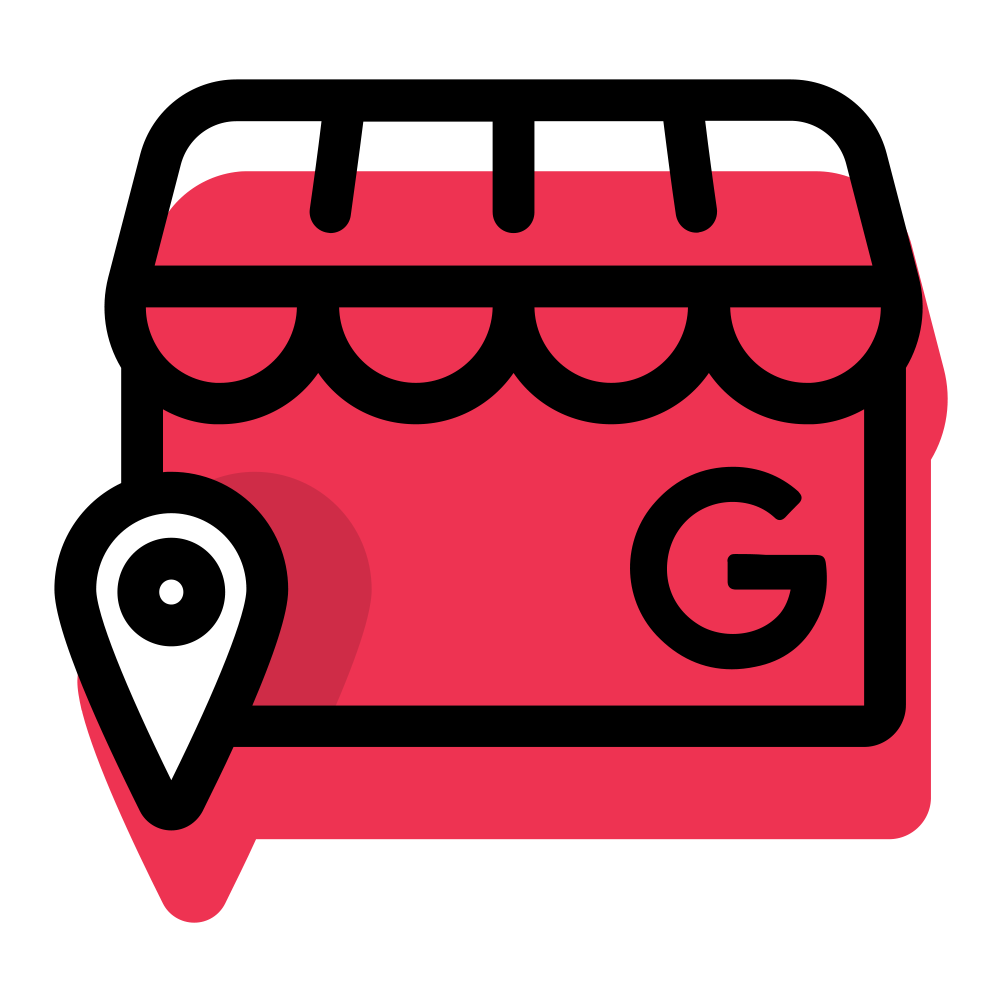
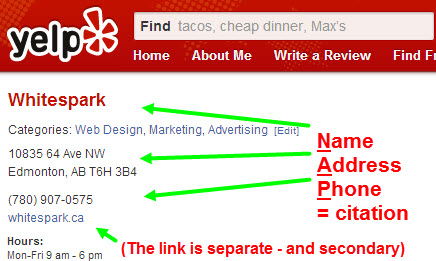
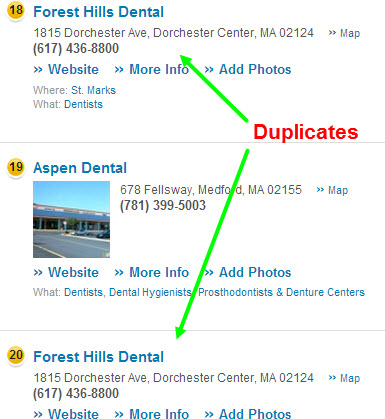
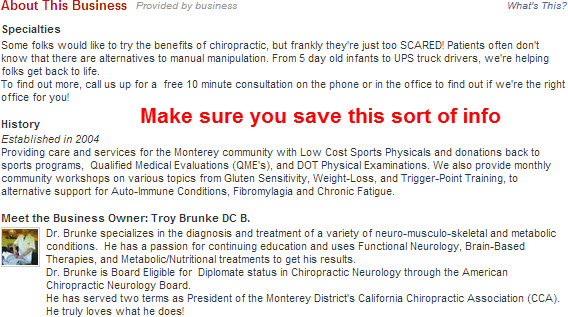
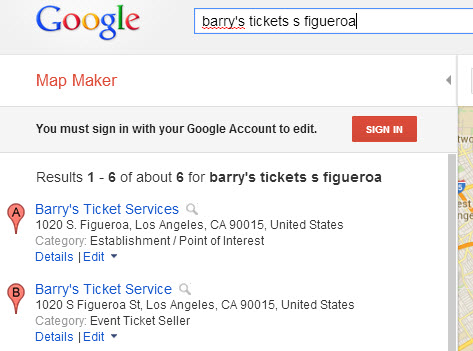
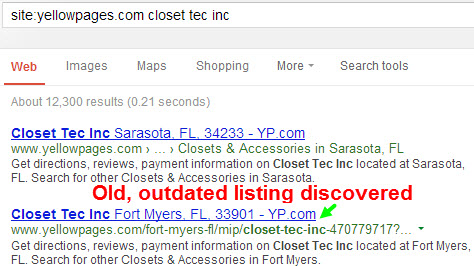
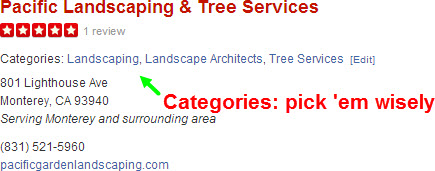


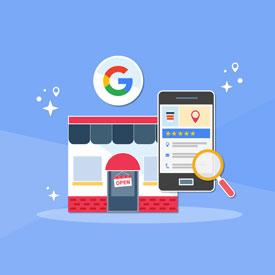








94 comments on “Local Citation Building Best-Practices”
Awesome post, Phil!!! You pretty much nailed everything. I just wanted to mention something in regards with point 23. Always use the most “unique” part of your business name when checking around. For instance, if your business name is Law Offices of John Schmitz, and your business is located in Miami (for instance), the chances are:
1) That your business might not be listed everywhere exactly as “Law Offices of John Schmitz”
2) That if you search for things like ” John Schmitz”, many of the websites will return completely unrelated trash
3) There are many law offices and many John’s in Miami
And then you are left with “Schmitz” which, without being a rocket scientist, you could guess is quite a unique word for a business name. Therefore, search JUST for “Schmitz” in Miami on the sites and you would be surprised how many results will pop up that you could never think of looking for 🙂
And also a small comment on point 43: even if you did everything perfectly, even if you have cleaned up every single citation, you would be surprised that if you go back and check in a couple of months, chances are high that there will be AT LEAST a few incorrect listings that have popped up after your cleaning up. Possible reasons are:
– At the time of your cleaning-up the information was stored at the backend of the databases of the particular websites and it just appeared later
– At the time of your cleaning-up, some of the data aggregators fed the business directory with the oudated information (or the other way round – the business directory pulled it)
– You are still listed in another way with some of the government organizations and some of the business directories that source their data from there kept “rediscovering” it.
Again, epic post and if only everyone was doing it this way…
Great additional points Nyagoslav!
I knew you’d be the first commenter! Your local seo post radar is amazing. 🙂
Thanks for the fantastic points, Nyagoslav – and for stopping by!
For #23, yeah, it’s definitely better to start searching with a “narrow†net, by entering the most-unique part of the name. If you come up empty-handing, maybe only then is it time to search more broadly/generically for your listing.
For #43, that’s exactly what I was getting at (but probably didn’t articulate thoroughly): there’s pretty much always some “drift†in your citations, no matter how well you do them initially. It’s so much easier to maintain them over time, than to let them go to seed by neglecting them. I like to think of it as taking your local visibility to the doctor for a physical.
We are all always on the look for great stuff, aren’t we 🙂
Really awesome article about local citation. Nyagoslav also had a fantastic comment!
What do you guys recommend when a biz has multiple locations? Do you guys recommend one listing per location? What about the name? Do we include any keyword in the name?
Darren,
Many thanks for publishing another wonderful Phil Rozek post on local listings.
The information, as usual, is easy to read, and comprehensive- even down to the ‘Duh’ reminders!
Thank you both.
Great post and lot of details. Just a reminder OH JOY Bing started to accept listing management, and yes Fiverr is bad for long term strategies !
This is a great post! I had a brick/mortar business previously and did some citations (with the help of Whitespark’s tools – great stuff!) and was able to be found locally.
I now have a new business as a real estate agent where I don’t have an actual office. I’m confused how I can apply citations to this service business since I don’t have an actual address. From what I’ve researched, it seems I could possibly use my home address and list an “area” that I cover and hide my address, but the town that I live in is not the town that I want to focus on and claim as the service area that I cover.
And, as a real estate agent, my customers don’t technically come to a brick & mortar location that I have.
Also, I want to be able to obtain reviews from customers.
Any suggestions on how to best use citations in this type of situation?
Phil,
Great post – you have covered it all! We know a lot about citations because we had been doing them for our Clients. It was a learning experience for us, so it did take more than a couple of hours to do, even if I’d done them before. The sites are continually changing the rules and what you an add to the listing. You can now add your social media links to many of the listing. The local Patch is one we were doing and they did a complete redesign. I’ve kept with your blog on Localeze and their new rules. Yahoo! never updates and if your still have to use the Google Places Dashboard, it takes forever or never for a change to go through. There’s a lot more examples of roadblocks with existing citations. Businesses that have been listed and then change their name or address are a nightmare. A brand new business, that has no citations, are the easiest and yes, it may only take a few hours to get them setup on the top 20 to start.
You need to be organized and streamline the process. We are working on something right now that will help users be organized, everything in one place, but have had to delay release because of the data aggregator changes and more.
I’m always confused about the naming convention. Are we claiming or adding Citatons or business listings. I know Citations are mentions of your business and the NAP should be the same across all. Many of the sites let you add content such as a business description, hours, your social media sites, etc. We use a client intake form to keep all of that info in one place What is confusing is that many people call citations “business listing” If you look at the Citation lists, you will see the data providers, search engines, directory listings, organizations such as the BBB and Chamber of commerce, industry specific for lawyers and doctors. Do these all fall under the umbrella of Citations? Or should they be called Business Listings. We created a list of 21 free citations any type of business should be listed on that includes Google+ Local, Bing Places for Business, Yahoo Local, then the directory listing, Yelp, Hotfrog, Citysearch, Patch, and a couple of data providers. Are these all considered Citations? Or should they be broken out into Citations, Business listings, Data Aggregators, Review sites, etc.
I want to make sure what we are calling Citation are citations.
Thanks,
Susan
Great Post Phil
We do local listings in the UK for clients and all of your best practices apply. However, the listings are still shown in
Agree with Nyagoslav about Point 23 ensuring the tight method for searching for dupes first.
Would also say be VERY wary about using YEXT as a provider (Point 11) the revertion to old style listings from previous (if you decide to stop paying) can get you into all sorts of issues.
As you say the time and effort of doing this by the book is well worth it.
Phil – Thanks for great post as ever
Ian Bowland
Thank you Phil. I gotta say this is the best post on this subject I’ve come across and an excellent resource we will be coming back to a lot I am sure. Great work!
Well Done!!
Picked up a few tidbits there that will be added to the repertoire!
2 additional strategies that I implement and find invaluable:
(1) I have a column on my spreadsheet labeled Submission Date. This way, I know if it’s been 6 weeks and I haven’t heard from a client that was sent a PIN verification, that it’s time to find out where the breakdown occurred and/or resend the PIN to them.
(2) Also on the spreadsheet, I have columns for Status and Next Step. This lets me know exactly where in the process we are at all times.
One Question Phil in regards to #21: Is there a specific site you use to determine the official/legal name of a business? (most of my clients are in FL and we have sunbiz to look them up. I’ve heard of others who rely on USPS, County Clerk’s office, sba.gov, etc)
And I’ll 2nd Nyagaslov’s epic post comment!
Great post, Phil. I have one question about a suite address…
Our address has 3 different businesses in suite A, B, and C. Almost all of our citations (over 54, including google) list only the primary address, but a few of them include “Ste B”. Our Yelp listing is the top result when you google just the primary address. How important do you think it is to try to add “Ste B” to all of our citations?
@Everyone
Thanks for your compliments and great feedback!
@Marcelo
Each location of a multi-location business needs to have its own Google+ Local listing (assuming you’re eligible), and each location needs its own batch of citations done. For example, if you have 3 locations, you’ll end up listing yourself on Yelp 3 separate times, on AngiesList 3 separate times, and so on. There’s no way to do it in bulk. As for the name, just use whatever the official/registered business name is; don’t try to put in any keywords that aren’t part of that.
@John P.
Thanks – and you’re welcome.
@Mohammed
Very true.
@John R.
Without knowing more about your situation, I would suggest using your home address. You’ll have to “hide†it from showing publicly on your Google listing. Most of the listing sites will also give you the option to do so, but you don’t need to. Just depends how much of a concern privacy is.
@Susan
Great question. What you’re doing – and have done so far – is claiming and completing business listings, pretty much all of which earn you citations. Sites like ExpressUpdate and LocalEze certainly are citations (as they’re commonly understood), because the NAP info is in those listings and indexed by Google. But that’s not why you list your business on those sites; rather, you do it for the sake of the many other listings – other potential citations – that are fed by those sites.
@Ian
Great points. Thanks for that UK perspective! It is a somewhat different ball game there.
@Adam
Thanks!
@Scott
Good call. I have exactly those same columns in my spreadsheets.
In terms of how to determine the official name of the business, first and foremost, I just ask the client. When in doubt, I’ll triangulate by looking at a trusted source like ExpressUpdate. Once in a blue moon I’ll look at the city’s business-registration records.
@Chase
Having the sutie # in there isn’t imperative, but I’d try to specify it whenever possible.
OMG that Dilbert password comic strip put this whole post over the top! Really, really, really great info. Should clear a lot of things up for people who bothered to read the entire thing and some of the links.
This is the ultimate RoadMap!
Thank you. Been doing some of these steps, now you’ve made it easy to understand check list. Been wanting to try WhiteSpark and now I will.
2 questions –
1) Getting a LOT of marketing calls from Signpost to “build” citations for a franchise I am working with — what’s your take on this? They also blast deals out there for local businesses.
2) I’d like to purchase an excel spead sheet to track all this — vs. starting from scratch. Any ideas?
Thanks again. I’ve unsubscribed to many email lists this year but keep yours because i know it’s 110% useful content.
Great post Phil, and Nyagoslav also had some great insight.
Pro advice for the Pro’s 🙂
@Kyle
Love me some Dilbert. Thanks for your compliments!
@PJ
I don’t know the first thing about Signpost, but at first blush I’m guessing it has some partnership with Yext. Sounds similar. I can’t really opine on how good they are. In any case, as long as they can follow the best-practices we’ve laid out here, it’s all good.
I’ve put an example worksheet on Google Drive: http://bit.ly/14TYXRg
@Andrew
Thanks! Darren added a lot of excellent points. He and Nyagoslav are the real experts here 🙂
Phil, great work here. So many different angles tackled. Passed along this link to a colleague just now. We were discussing substitution of Yext for manual builds, this is great backup for the case I was trying to make for manual effort.
Really nice update on citations. However, your information and link on Factual was kind of a dead end. I can’t find any way to set up a new business on Factual.
@Dave
Thanks. Yeah, Yext is handy in some situations, but smart manual citation-building will work in any situation.
@Randy
Appreciate the intel. What did you try, in terms of contacting Factual for inclusion? Including the point on Factual was a joint call by Darren and me, so he may have better info than I do.
Hi Randy,
Factual doesn’t have an “add your business” feature. To get your listing added, you email them and they’ll create a listing for you.
Before emailing them, I’d suggest first checking closely to see if you’re already listed by searching here: http://www.factual.com/data/t/places. If you are listed, you can login and additional details to the listing – look for the little “edit” tag on the right side of the map. It’s cool how they show you the sources of the listing data under the “Crosswalk” section.
If you’re not listed, look at all the other listings to see what fields they accept and make sure you include all the applicable fields when you email them.
When you’re sure you’re not already listed, and you have gathered all the information needed for your listing, email them at To get your listing added, send an email to [email protected] to request adding your business to their database.
Phil,
Thank you for this primo info, it’s extremely helpful and timely. Your suggestions, tips & new-to-me resources (Factual for one, which worked on my end) will become valuable assets.
Is that you in the mud? I still get all tingly when thinking of that pic of Arnold (ahem, Phil) in the jungle hunting the Predator 🙂
Thanks go out to Darren and Nyagoslav for their valuable insights..I’ve already shared this post and will continue, it’s just too damn good to keep to myself.
Keep on!!
What an incredible GUIDE FOR LOCAL LISTINGS – perfect Phil 🙂
This resource for local SEO and best practices on local citations is well done! It’s great how you have spelled out the difference between links and citations. Thanks for sharing this valuable resource with the SEO community!
Wow this list was long but I actually read the entire thing b/c it was so detailed and good. I can’t think of anything you missed 🙂
Wow, thanks for publishing such a piece of work so that those of us who focus on other aspects of SEO have a quality resource to make use of when it’s time to spend time with local. I was especially glad you pointed out that tidbit about Yext.
Thanks Phil! (and everyone who piped in.) I just discovered factual recently and would like to add on more point to Darren’s comment.
When I searched their “global” section not all listings showed. I also had to search the Health Professionals section to get a third one that was on Factual. It’s possible there was an item missing from the search term that “hid” that listing?
Great post, great feedback!
has there been studies done that show removing duplicate directory listings can help improve rankings? or can anyone speak from experience?
Great write as usual Phil!
To share my thought on #37 – with regards to “Street”.
I would be cautious of using “St.” (note that a period is used here) as this is also the universal abbreviation for Saint.
Example:
ST. PAUL STREET
ST. PAUL ST.
ST. PAUL ST
(All in your backyard on the MBTA Green Line – Boston, BTW)
I would avoid using the middle one.
Hate to be so detail-critical for such a great article – but for when it matters – this could matter. Again, great job!!
Great post Phil! Great to have everything so organized an in one place, will make a great training tool!
@Jim
Any time – and thanks for the compliments.
@Steven
Great to hear Factual worked.
The photo is of a Tough Guy or Tough Mudder or one of those types of competitions. Although I’ll go out running in shorts when it’s 15 degrees outside, that muddy bloke in the photo is not me!
@Andy
Thanks a bunch!
@Chris
Love that you referenced that familiar old Green Line stop – goes right through my alma mater. I think it would be very hard to make your address so syntactically confusing that Google can’t associate it with your cluster. Never seen it happen, but I’m sure it has. I’ve found that periods just don’t matter, and don’t “confuse†Google.
@Joy
Thanks! Although I’m sure there’s stuff I missed…
@Holly
Hmmm…I’m not quite clear on the question (though it sounds like a good one). It sounds like you were able to find your listing after a few tries; is that accurate to say? Any chance you could unpack that a little?
@Darrel
Great question. I’m not aware of any studies on whether true, exact duplicates hurt your rankings. Near-duplicates certainly can, because by definition some of the info is incorrect. Like other people, I sometimes conflate the two types of duplicates (exact – and near-duplicates), which I probably shouldn’t do, because it can be confusing.
Based on my experience, I’d say exact duplicate citations don’t hurt your rankings much. But that’s just my observation. Probably the bigger reason to get rid of them is that you don’t want any reviews you have on those sites to be spread out over a bunch of different listings; you want all your Yelp reviews consolidated on one Yelp listing, all your InsiderPages reviews on one listing, and so forth.
Great post, Phil, as usual!
Quick thing about #39. In the new Google+ [enter name] Dashboard you can use # instead of Suite. The old dashboard did not allow the use of #, but now it does.
Have been seeing some data merging changing Suite # to just #.
Cheers,
Blake
I’m always anxious to dive in and read your new posts, top to bottom, because they are always outstanding.
Always mindful of my small business owner budgets, is there any way for them to avoid or minimize the recurring annual data aggregator fees? And do you typically recommend the least costly of their listing options or a mid-to-high-end alternative?
@Blake
Great point – thanks!
@Donna
Thanks for your compliments!
Obviously, I don’t know any of the specifics of your clients’ situations – like how many locations they have, how much and how frequently their business info has changed, how much of a problem NAPW consistency has been, etc.
But my general advice is that you should only pay for your data-aggregator listings if there’s no other way to get your NAP info fixed completely and in a timely manner.
LocalEze is the main one I’m thinking of: as you may know, you can claim and make one yearly change to your listing for free, but if that won’t work out for whatever reason, you’ve got to pay. Doesn’t necessarily mean you also need to pay for it the following year, though.
I don’t know that ExpressUpdate.com charges anything yearly, so you should be all set there. I don’t believe Acxiom (MyBusinessListingManager.com) charges just to add one listing, either.
Thanks, great post! I’ve shared it on Twitter to let more people understand the meaning on citations: Phone number, business name and address. 🙂 Ben
You hit the nail on the head with paying for the listings. For whatever reason, clients seem to think that going with the many free listing is good enough yet they don’t know how a paid listing can over power even 10s of free listings.
Thanks for sharing!
Excellent post Phil.
Do anyone know of a WordPress plugin that would correctly format the NAP on a site?
ie. Google friendly/schema/micro format, etc.
@Spook SEO
A lot of paid directories are junk. Some are good. The free listings will always be the most-important ones, but when in cases where it’s a game of inches, business owners shouldn’t limit their options.
@Mark
I’d check out Yoast’s Local SEO Plugin. There’s also this one from Raven Tools: http://wordpress.org/plugins/schema-creator/
Thanks, Ben!
Here in Australia, there aren’t really any major ‘data aggregators’ like Localeze in the States, although Sensis (owner of Yellow Pages Australia) does syndicate it’s listing data across many sites & directories, including Google. I’ve found recently that a few of my clients who have metered phone numbers on their Yellow Pages online listings are experiencing some difficulties in that their Yellow Pages tracking numbers are showing up on their Google Places listings instead of their real phone number from their consistent NAP. This not only heavily skews their Yellow Pages metered call data, but also (kind of) challenges the importance of having a consistent NAP across the web. The only inference I can make is that Google Australia values & trusts the listing data from Sensis/Yellow Pages network more than any other citation source in Australia. This makes sense because of their dominance of the Australian business directory market, but I’m still confused as to why Google would sometimes display this random tracking number instead of a number found in multiple other citations of consistent NAPs across the web. Any suggestions/comments?
Good observations, Dave. I knew that Sensis/YP is the big data-provider Down Under. It’s also always been the case that those metered numbers can murder your NAP consistency. In any case, it’s precisely because Sensis/YP is so trusted a source that a rogue phone number is enough to cause Google to auto-generate a Places listing.
Great piece, Phil. Every post/article you write helps my Local SEO and revenue.
Thanks for stopping by, Mike! I know how serious you are about citations and reviews.
Thanks for this list! It’s a great resource for a beginner SEO like myself.
One question: What’s with the Tough Mudder photo? Is it because this post is like local citation building boot camp, or because citation building can be messy and difficult?
@Chelsea
Both! (But mostly the latter.)
Best Local SEO Tips i have ever read. Covers everything to rank High in Local SEO.
Big thanks to Phil.
Regards
Sunil Datar
@Sunil
Thanks – and you’re quite welcome.
@Everyone
Just FYI, there’s been a minor update to how to submit a business to Factual:
http://www.localvisibilitysystem.com/2013/09/24/how-to-add-your-business-to-factual/#comment-7499
This is one of the best overall local seo articles I have ever seen. Great job writing this. I will start to use some of this as a checklist for my local SEO.
Wow. This post nailed it. Very thorough look at citations. Thanks again Phil!
For tip 19, Never submit a listing to a site before thoroughly checking… I search all their past phone numbers and business names on the site itself. But even before that I just try Googling it and finding as many wrong listings that way as well. Typically I will find lots of variations in business name and address by looking by phone number.
What a great list to go through for local citation, thanks for sharing and taking the time to put it together Phil!
I wasn’t too sure about having the exact same address everywhere or not and you explained it clearly: all directories don’t show the address the same way anyway so search engines will figure it out, but make it the same as much as possible.
Thanks!
@Maxwell and Ryan
Thanks!
@Jason
That works.
@Laure
Yeah, Google is more than “smart†enough to deal with those little variations.
Awesome post! This is really amazing!
What do I need to sustain my rankings with competition? I frequently see the rankings are going down, or has been lost completely. One of my client had the same issue with Google places when they lost the NPA, there might be something to keep hold on the rankings and NPA on the map.
🙁
@Satish
Rankings can drop for any number of reasons. But I do find that a lot of times when people say “Phil, I’ve done everything I can,” I do a little digging and find that they never did have their citations squared away, or they’re violating the Google Places Quality Guidelines. Start by taking a very hard look at the “obvious” stuff; those are usually the only factors that can explain dramatic drops.
Great post Phil, really enjoyed reading this and it was very helpful. Quick question: I would assume one should follow these practices for Canadian companies, but can you give any insight on anything to do differently when building citations for a business in Canada? TIA
Hey Scott,
As a Canadian Local SEO myself, I can tell you that there are no differences to the best practices. The only difference would be the sites you build citations on, and these two resources should be helpful:
http://moz.com/blog/2013-local-search-ecosystems (scroll down for the Canadian ecosysem)
and
https://whitespark.ca/blog/post/10-canadian-local-business-reviews-ecosystem
Nice post Phil, amazing article. The duplicate listing issues are a great reminder for me. its as easy as you say it is. Thanks a lot for the heads up!
This is a huge post.
Some seriously top tips here. This should serve as a checklist for all local businesses if they have any sense.
Excellent read and very thorough. It’s funny how a lot of businesses overlook the obvious things such as this and jump straight into “building links”. This is definitely an area of optimization that goes overlooked in many cases unfortunately.
This is great information as always from Whitespark. I have used the services for multiple clients. If I might ask a question, would it matter if the NAPW was only inconsistent by one small area such as having “st.” or “street” in the address? Has search engine technology become smart enough to associate a business correctly with only a minor inconsistency such as this or does listings have to be perfect to the letter?
Another UK Citation Business site is http://www.freebd.co.uk
@Chris Calkins
No, minor differences like “St.” versus “Street” don’t matter. Yes, Google et al recognize that they mean the same thing.
Thank you so much. This post made my day. I have been trying to compile a list of things I need to start building citation and yet. Here is the list….Thanks for being a life saver!!!
Canadian phone numbers largely do not use parenthesis, Google forces that formatting in the local listing though so what is the best way to format a phone number for a business in Canada ?
Hi Ray,
I’m Canadian, and I haven’t seen a preference for numbers in one format versus the other. Regardless, Google understands both perfectly well and will associate those mentions with your business. You don’t have to worry about one format versus the other.
Thanks to Phil for the EXCELLENT “how to.” and to Darren for posting.
As always, Phil – most excellent info!
15 Yes – the prerequisite for many citation sites is the email for your domain.
17) AT last!!! Recognition for what I have asked you, Andrew and David about!
Think long and hard about whether you want to keep running online Yellow Pages -style ads, which often use separate call-tracking numbers. Why?
I brought this to your attention and Andrew’s several months ago. One client at the time had 7 – yes seven, numbers that “Dex talked them into. Gads! I told them to let all of these expire as they “diluted” their NAMW.
Your response at the time indicated you had never encountered this – so right-on!
I am certain many other SEO profs have run into this.
19 Amen! And the issue is many times they list it as a different name or they moved and that data is there but does not appear in a “Phone number” or “address search!”
23 Absolutely… partial name and cross category checking.
26 – add the apostrophe or not to add the apostrophe Pipos versus Pipo’s. Hmmm.
28 – thanks
35 Ummmm yeah I can attest to this….
36 I have clients decide the password and require them to give me the same and an additional character (symbol) for those sites that require it.
What a post Phil,
As all of your post this is also very informative and interesting to read. You touched every part of local citation building i have bookmarked it, will share it with my colleagues and business owners who neglect the power of local listings.
Phil, I’ve recently changed my ‘online marketing’ focus to local businesses and I’m learning a lot from you and others here. Thanks for such a great article! Could you explain #17 a bit further? I don’t understand the “separate call-tracking numbers.” And how “these numbers can kill the consistency of your business info online, and kill your rankings in the process.”
This was an awesome article, Phil! Thanks to #38 I’ll be adding those alternate and fax numbers. Great checklist to keep handy!
Thanks, @Holly, @Shane, @Sam.
@Felicia
Here’s a great post about why call-tracking numbers are bad:
http://www.searchinfluence.com/2013/05/call-tracking-in-local-seo/
Thank you Phil for sharing this, really loved this post. i realized that this post is 1 year old, will it makes any difference with new 2014 algorithms ? just wondering!
Great piece of information, had to re-do some citations. Real big help thanks.
Does it matter if my town is spelled “saint laurent” on google yet for yelp it puts it in as “saint-laurent” and in FB “ville saint laurent” … so additional dash and word than google ?
thanks !!!!!
I am starting to do citations for people, and yes I have used Fiverr, probably not the best! But the businesses I am dealing with barely believe in citations, and won’t pay what they are worth, like using you guys. I tried Factual, but have no idea what to do with that. Plus Yahoo! says the address is invalid for one of my client’s addresses, that I know is correct. But you have a great article I am going to learn from, it’s not easy for sure, but I believe in citations. thanks
Is there a Canadian Data Aggregator or we just wing it? Finding Canadian specific information services for local is quite difficult
Phil, great post. Thanks for the cheap and easy warning up front. Just what I needed to hear.
Hi Phill,
Another great post of you. Thank you for sharing this detailed and easy to read info!
Great article Phil.
My favorite gem is #34. If you don’t have time to go after everything, tackle the biggest elephant first, the one that gets the most attention and clean her up.
Great article Phil. With my recent switch to local SEO this has been a great way to make sure I’m doing my job to the best of my abilities!
Just started following you on Twitter, look forward to learning even more!
I remember when Susan Walsh decided that it was a bad idea to follow those rules and look at her now! Good job Susan 😉
I’m a lawyer with a new bankruptcy practice and a new Website/SEO Company. After asking my SEO company if I should “trade links” with friends he directed me to this website to read about some better ways to “earn links.” I see why now. Thanks! I’ll be hanging out here more often!
This is a fantatsic resource Phil, I only just came across it. I was recently approached by a new client seeking to get there business listings sorted out. Geez what a mess. You make a good point of quality over quantity. These guys had someone go out & build hundreds of citations with inconsistent NAPW information. Anyhow, resources such as this I can point my clients to for them to understand. Thanks
Thanks for this comprehensive piece. I am wondering whether I can benefit from any of it. My start-up, Honest Health News, a webzine devoted to independent, evidence-base healthy living news and investigations, is web only and all contact info is the url (honesthealthnews.org), Facebook, and Twitter to date. How does someone in my situation best utilize the resources out there without giving phone and street address information? Thanks! Joy
@Joy: Citations aren’t going to help you. You need to focus on onsite SEO, content, and link building.
Local SEO Godsend!
Thanks for the kick-butt post guys. 2 years old too… talk about staying power. Between this, the tools, and the top 50 citations post (which is what brought me to the website), Whitespark has made itself one of my top SEO resources in the blink of an eye.
Well done and thanks!
Great summary (if a list of 43 items can be categorized as such!). I regularly come across folks looking for SEO/local optimization and have listings but have no idea what their logins are, etc. As you mentioned, Google Drive is awesome for keeping this stuff organized!
One thing you can also include, for that extra local boost, is geo tagging your image, and have a go to version of you keep on hand for uploading into various profiles where you can. Some systems will rename the image, scraping out extra meta data, but where the geo exif data stays intact, it can have a noticeable effect in the serps. Google does read it, and it does affect it’s rankings.
HI . i have confusions for multiple business location citation. as per the conversations in comments , i understood that each locations needs a unique login to be listed in the same directory.
Eg: I have 50 branches of my restaurant business and i want to list in sensis/yellowpages.com.au. so i have to sign up / create listing using 50 unique emails in sensis. do i sound correct, please give some insights on this.
Thank you
sachid
Great post Phil. This is very valuable information for a local company looking to have a stronger presence online and get into the geo specific snack pack. Citations are the foundation of an online presence and I would recommend this article to anyone starting out.
Thanks Phil
that’s a real cool article, just searched for this quite long and now got it from your email newsletter – worth every word – will try to use as much in Germany too 🙂
Hi Phil, how about a UK company doing virtual services a customer base in the US. Should that company just get a ‘Virtual Address in New York and list all there Citations in the US?
Great list thanks – came across it as looking to do more local seo and citations etc. Would you say that the list is still relevant today, 2019, as it was when you wrote the article, or are there factors that may have changed somewhat?
Great contribution, Phil.
We’ve been finding the quality (DA) of both citations and backlinks increasingly important over quantity in the years since you originally posted this.
Comments are closed.